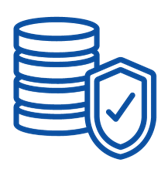In detail explained in section 2.2, pages 26-29 of the BRAIF, this group of phases focuses on the actual implementation based on the global principles defined for the delivery of the integrated public service.

|
Standards and Processes |
|
Phase |
Description/Scope |
|

|
1. Development of a trusted registry | This phase takes place when important pieces of authoritative information are not managed by Base Registries. Hence, two main scenarios can occur to trigger the need for this phase: either a new base registry should be built from scratch, or the mandate or scope of existing base registries has to be significantly changed |

|
2.Information Exchange |
Information exchange is the first step towards the construction of an integrated public service, where multiple base registries are really collaborating and contributing technically to build a future integrated public service. The data stored in the base registry will be exchanged with other stakeholders following the defined data policies and the interoperability agreements. |

|
3. Once-Only Principle |
The Once-Only Principle entails that citizens and businesses provide diverse data only once in contact with public administrations, while public administration bodies take actions to internally share and reuse these data – even across borders – always in respect of data protection regulations and other constraints. |

|
4. Aggregation / Enrichment |
Aggregation and enrichment are transformations that can be made to raw data in order to adjust the information to the needs of the end users. |

|
5. Data Evaluation |
The service, once provided, should be monitored and evaluated. It should be assessed whether it meets the objectives established during the definition of the service. The result of this assessment is the driver for possible changes to the service, its objectives and/or its organisation. |

